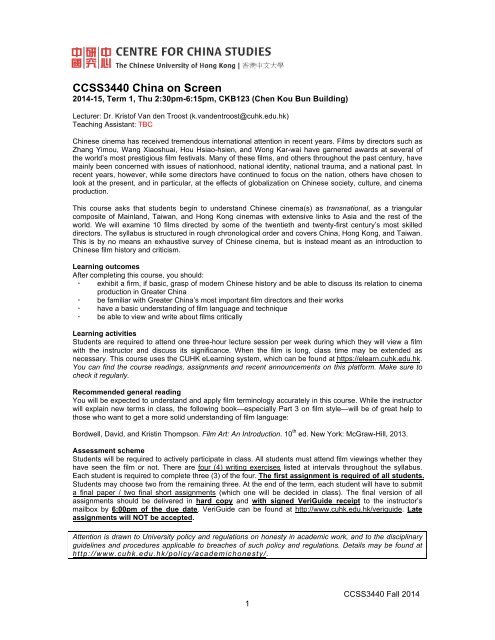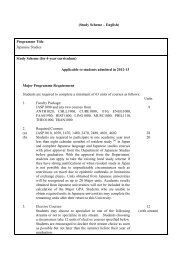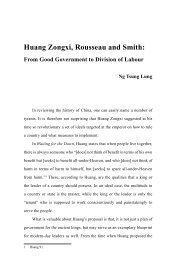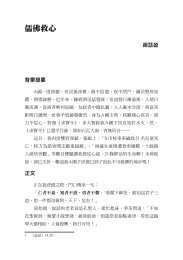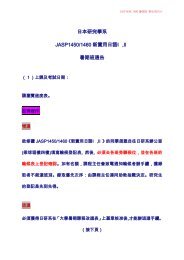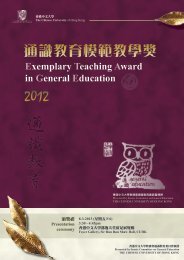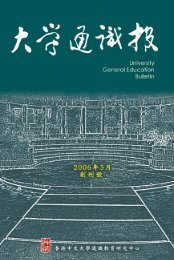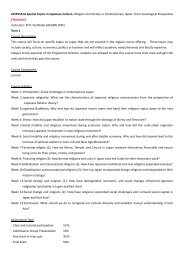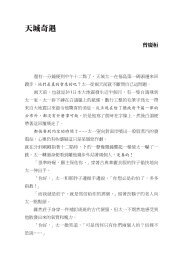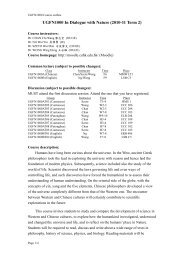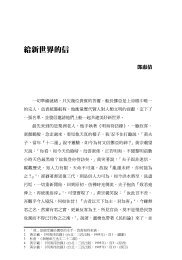CCSS3440 China on Screen - The Chinese University of Hong Kong
CCSS3440 China on Screen - The Chinese University of Hong Kong
CCSS3440 China on Screen - The Chinese University of Hong Kong
Create successful ePaper yourself
Turn your PDF publications into a flip-book with our unique Google optimized e-Paper software.
<str<strong>on</strong>g>CCSS3440</str<strong>on</strong>g> <str<strong>on</strong>g>China</str<strong>on</strong>g> <strong>on</strong> <strong>Screen</strong><br />
2014-15, Term 1, Thu 2:30pm-6:15pm, CKB123 (Chen Kou Bun Building)<br />
Lecturer: Dr. Krist<strong>of</strong> Van den Troost (k.vandentroost@cuhk.edu.hk)<br />
Teaching Assistant: TBC<br />
<strong>Chinese</strong> cinema has received tremendous internati<strong>on</strong>al attenti<strong>on</strong> in recent years. Films by directors such as<br />
Zhang Yimou, Wang Xiaoshuai, Hou Hsiao-hsien, and W<strong>on</strong>g Kar-wai have garnered awards at several <strong>of</strong><br />
the world’s most prestigious film festivals. Many <strong>of</strong> these films, and others throughout the past century, have<br />
mainly been c<strong>on</strong>cerned with issues <strong>of</strong> nati<strong>on</strong>hood, nati<strong>on</strong>al identity, nati<strong>on</strong>al trauma, and a nati<strong>on</strong>al past. In<br />
recent years, however, while some directors have c<strong>on</strong>tinued to focus <strong>on</strong> the nati<strong>on</strong>, others have chosen to<br />
look at the present, and in particular, at the effects <strong>of</strong> globalizati<strong>on</strong> <strong>on</strong> <strong>Chinese</strong> society, culture, and cinema<br />
producti<strong>on</strong>.<br />
This course asks that students begin to understand <strong>Chinese</strong> cinema(s) as transnati<strong>on</strong>al, as a triangular<br />
composite <strong>of</strong> Mainland, Taiwan, and H<strong>on</strong>g K<strong>on</strong>g cinemas with extensive links to Asia and the rest <strong>of</strong> the<br />
world. We will examine 10 films directed by some <strong>of</strong> the twentieth and twenty-first century’s most skilled<br />
directors. <strong>The</strong> syllabus is structured in rough chr<strong>on</strong>ological order and covers <str<strong>on</strong>g>China</str<strong>on</strong>g>, H<strong>on</strong>g K<strong>on</strong>g, and Taiwan.<br />
This is by no means an exhaustive survey <strong>of</strong> <strong>Chinese</strong> cinema, but is instead meant as an introducti<strong>on</strong> to<br />
<strong>Chinese</strong> film history and criticism.<br />
Learning outcomes<br />
After completing this course, you should:<br />
! exhibit a firm, if basic, grasp <strong>of</strong> modern <strong>Chinese</strong> history and be able to discuss its relati<strong>on</strong> to cinema<br />
producti<strong>on</strong> in Greater <str<strong>on</strong>g>China</str<strong>on</strong>g><br />
! be familiar with Greater <str<strong>on</strong>g>China</str<strong>on</strong>g>’s most important film directors and their works<br />
! have a basic understanding <strong>of</strong> film language and technique<br />
! be able to view and write about films critically<br />
Learning activities<br />
Students are required to attend <strong>on</strong>e three-hour lecture sessi<strong>on</strong> per week during which they will view a film<br />
with the instructor and discuss its significance. When the film is l<strong>on</strong>g, class time may be extended as<br />
necessary. This course uses the CUHK eLearning system, which can be found at https://elearn.cuhk.edu.hk.<br />
You can find the course readings, assignments and recent announcements <strong>on</strong> this platform. Make sure to<br />
check it regularly.<br />
Recommended general reading<br />
You will be expected to understand and apply film terminology accurately in this course. While the instructor<br />
will explain new terms in class, the following book—especially Part 3 <strong>on</strong> film style—will be <strong>of</strong> great help to<br />
those who want to get a more solid understanding <strong>of</strong> film language:<br />
Bordwell, David, and Kristin Thomps<strong>on</strong>. Film Art: An Introducti<strong>on</strong>. 10 th ed. New York: McGraw-Hill, 2013.<br />
Assessment scheme<br />
Students will be required to actively participate in class. All students must attend film viewings whether they<br />
have seen the film or not. <strong>The</strong>re are four (4) writing exercises listed at intervals throughout the syllabus.<br />
Each student is required to complete three (3) <strong>of</strong> the four. <strong>The</strong> first assignment is required <strong>of</strong> all students.<br />
Students may choose two from the remaining three. At the end <strong>of</strong> the term, each student will have to submit<br />
a final paper / two final short assignments (which <strong>on</strong>e will be decided in class). <strong>The</strong> final versi<strong>on</strong> <strong>of</strong> all<br />
assignments should be delivered in hard copy and with signed VeriGuide receipt to the instructor’s<br />
mailbox by 6:00pm <strong>of</strong> the due date. VeriGuide can be found at http://www.cuhk.edu.hk/veriguide. Late<br />
assignments will NOT be accepted.<br />
Attenti<strong>on</strong> is drawn to <strong>University</strong> policy and regulati<strong>on</strong>s <strong>on</strong> h<strong>on</strong>esty in academic work, and to the disciplinary<br />
guidelines and procedures applicable to breaches <strong>of</strong> such policy and regulati<strong>on</strong>s. Details may be found at<br />
http://www.cuhk.edu.hk/policy/academich<strong>on</strong>esty/.<br />
1<br />
<str<strong>on</strong>g>CCSS3440</str<strong>on</strong>g> Fall 2014
Course Grading System:<br />
Attendance, participati<strong>on</strong> 20%<br />
Short assignments (3 <strong>of</strong> 4) 50%<br />
Final assignment 30%<br />
Course schedule<br />
[PDF versi<strong>on</strong>s <strong>of</strong> all readings and assignments can be found <strong>on</strong> the CUHK eLearning System.<br />
Registered students may access the <str<strong>on</strong>g>CCSS3440</str<strong>on</strong>g> account by using their CWEM ID and password.]<br />
Week 1: 4 September Introducti<strong>on</strong><br />
Pang, Laikwan. “<strong>The</strong> Instituti<strong>on</strong>alizati<strong>on</strong> <strong>of</strong> ‘<strong>Chinese</strong>’ Cinema as an Academic Discipline.” Journal<br />
<strong>of</strong> <strong>Chinese</strong> Cinemas 1, no. 1 (2007): 55-61.<br />
Week 2: 11 September <strong>The</strong> Goddess 神 女 (1934)<br />
Pang, Laikwan. “<strong>The</strong> Making <strong>of</strong> a Nati<strong>on</strong>al Cinema: Shanghai Films <strong>of</strong> the 1930s.” In <strong>The</strong> <strong>Chinese</strong><br />
Cinema Book, edited by S<strong>on</strong>g Hwee Lim and Julian Ward, 56-64. Basingstoke: British Film<br />
Institute/Palgrave Macmillan, 2011.<br />
Harris, Kristine. “<strong>The</strong> Goddess: Fallen Woman <strong>of</strong> Shanghai.” In <strong>Chinese</strong> Films in Focus: 25 New<br />
Takes, edited by Chris Berry, 111-19. L<strong>on</strong>d<strong>on</strong>: British Film Institute, 2003.<br />
Extra:<br />
Hansen, Miriam Bratu. “Fallen Women, Rising Stars, New Horiz<strong>on</strong>s: Shanghai Silent Film as Vernacular Modernism.” Film<br />
Quarterly 54, no. 1 (Autumn 2000): 10-22.<br />
Hjort, Mette. “Ruan Lingyu: Reflecti<strong>on</strong>s <strong>on</strong> an Individual Performance Style.” In <strong>Chinese</strong> Film Stars, edited by Mary<br />
Farquhar and Yingjin Zhang, 32-49. New York: Routledge, 2010.<br />
Week 3: 18 September Spring in a Small Town 小 城 之 春 (1948)<br />
Pickowicz, Paul G. “<strong>Chinese</strong> Film-making <strong>on</strong> the Eve <strong>of</strong> the Communist Revoluti<strong>on</strong>.” In <strong>The</strong><br />
<strong>Chinese</strong> Cinema Book, edited by S<strong>on</strong>g Hwee Lim and Julian Ward, 76-84. Basingstoke:<br />
British Film Institute/Palgrave Macmillan, 2011.<br />
Daruvala, Susan. “<strong>The</strong> Aesthetics and Moral Politics <strong>of</strong> Fei Mu’s Spring in a Small Town.” Journal<br />
<strong>of</strong> <strong>Chinese</strong> Cinemas 1, no. 3 (2007): 171-187.<br />
Extra:<br />
FitzGerald, Carolyn. “Spring in a Small Town: Gazing at Ruins.” In <strong>Chinese</strong> Films in Focus II, edited by Chris Berry, 205-<br />
11. Basingstoke/New York: BFI/Palgrave Macmillan, 2008.<br />
Teo, Stephen. “<strong>Chinese</strong> Melodrama.” In Traditi<strong>on</strong>s in World Cinema, edited by Linda Badley, R. Bart<strong>on</strong> Palmer and<br />
Steven Jay Schneider, 203-13. Edinburgh: Edinburgh UP, 2006.<br />
Week 4: 25 September Two Stage Sisters 舞 台 姐 妹 (1964)<br />
Clark, Paul. “Artists, Cadres, and Audiences: <strong>Chinese</strong> Socialist Cinema, 1949-1978.” In A<br />
Compani<strong>on</strong> to <strong>Chinese</strong> Cinema, edited by Yingjin Zhang, 42-56. Malden: Wiley-Blackwell,<br />
2012.<br />
Marchetti, Gina. “Two Stage Sisters: <strong>The</strong> Blossoming <strong>of</strong> a Revoluti<strong>on</strong>ary Aesthetic.” In<br />
Transnati<strong>on</strong>al <strong>Chinese</strong> Cinemas: Identity, Nati<strong>on</strong>hood, Gender, edited by Sheld<strong>on</strong> Hsiaopeng<br />
Lu, 59-80. H<strong>on</strong>olulu: U <strong>of</strong> Hawai’i P, 1997.<br />
Extra:<br />
Zhang, Yingjin. <strong>Chinese</strong> Nati<strong>on</strong>al Cinema. New York: Routledge, 2004. 189-224.<br />
***Friday 26 September<br />
Assignment 1 due: Spring in a Small Town (REQUIRED!)***<br />
Week 5: 2 October NO CLASS – Chung Yeung Festival<br />
2<br />
<str<strong>on</strong>g>CCSS3440</str<strong>on</strong>g> Fall 2014
Week 6: 9 October Red Sorghum 红 高 粱 (1987)<br />
Lars<strong>on</strong>, Wendy. “<strong>The</strong> Fifth Generati<strong>on</strong>: A Reassessment.” In <strong>The</strong> <strong>Chinese</strong> Cinema Book, edited<br />
by S<strong>on</strong>g Hwee Lim and Julian Ward, 113-21. Basingstoke: British Film Institute/Palgrave<br />
Macmillan, 2011.<br />
Lu, Sheld<strong>on</strong> Hsiao-peng. “Nati<strong>on</strong>al Cinema, Cultural Critique, Transnati<strong>on</strong>al Capital: <strong>The</strong> Films <strong>of</strong><br />
Zhang Yimou.” In Transnati<strong>on</strong>al <strong>Chinese</strong> Cinemas: Identity, Nati<strong>on</strong>hood, Gender, edited by<br />
Sheld<strong>on</strong> Hsiao-peng Lu, 105-36. H<strong>on</strong>olulu: U <strong>of</strong> Hawai’i P, 1997.<br />
Extra:<br />
James<strong>on</strong>, Fredric. “World Literature in an Age <strong>of</strong> Multinati<strong>on</strong>al Capitalism.” In <strong>The</strong> Current in Criticism: Essays <strong>on</strong> the<br />
Present and Future <strong>of</strong> Literary <strong>The</strong>ory, edited by Clayt<strong>on</strong> Koelb and Virgil Lokke, 139-58. West Lafayette: Purdue<br />
UP, 1987.<br />
Week 7: 16 October Beijing Bicycle 十 七 岁 的 单 车 (2001)<br />
McGrath, Jas<strong>on</strong>. “<strong>The</strong> Urban Generati<strong>on</strong>: Underground and Independent Films from the PRC.” In<br />
<strong>The</strong> <strong>Chinese</strong> Cinema Book, edited by S<strong>on</strong>g Hwee Lim and Julian Ward, 167-76. Basingstoke:<br />
British Film Institute/Palgrave Macmillan, 2011.<br />
Letteri, Richard. “Realism, Hybridity, and the C<strong>on</strong>structi<strong>on</strong> <strong>of</strong> Identity in Wang Xiaoshuai’s Beijing<br />
Bicycle.” Southeast Review <strong>of</strong> Asian Studies 29 (2007): 72-89.<br />
Extra:<br />
G<strong>on</strong>g, Haomin. Uneven Modernity: Literature, Film, and Intellectual Discourse in Postsocialist <str<strong>on</strong>g>China</str<strong>on</strong>g>. H<strong>on</strong>olulu: U <strong>of</strong><br />
Hawai’i P, 2012. 108-32.<br />
Zhang, Yingjin. Cinema, Space, and Polylocality in a Globalizing <str<strong>on</strong>g>China</str<strong>on</strong>g>. H<strong>on</strong>olulu: U <strong>of</strong> Hawai’i P, 2010. 103-19.<br />
***Friday 17 October<br />
Assignment 2 due: Two Stage Sisters***<br />
Week 8: 23 October <strong>The</strong> Killer 喋 血 雙 雄 (1989)<br />
Bordwell, David. Planet H<strong>on</strong>g K<strong>on</strong>g: Popular Cinema and the Art <strong>of</strong> Entertainment. 2 nd ed.<br />
Madis<strong>on</strong>: Irvingt<strong>on</strong> Way Institute Press, 2011. 1-11.<br />
Stringer, Julian. “‘Your Tender Smiles Give Me Strength’: Paradigms <strong>of</strong> Masculinity in John Woo’s<br />
A Better Tomorrow and <strong>The</strong> Killer.” <strong>Screen</strong> 38, no. 1 (Spring 1997): 25-41.<br />
Week 9: 30 October Chungking Express 重 慶 森 林 (1994)<br />
Hu, Brian. “<strong>The</strong> KTV Aesthetic: Popular Music Culture and C<strong>on</strong>temporary H<strong>on</strong>g K<strong>on</strong>g Cinema.”<br />
<strong>Screen</strong> 47, no. 4 (Winter 2006): 407-24.<br />
Extra:<br />
Teo, Stephen. W<strong>on</strong>g Kar-wai. L<strong>on</strong>d<strong>on</strong>: BFI Pub., 2005. 47-64.<br />
Abbas, Ackbar. “<strong>The</strong> New H<strong>on</strong>g K<strong>on</strong>g Cinema and the Deja Disparu.” In Asian Cinemas: A Reader & Guide, edited by<br />
Dimitris Eleftheriotis and Gary Needham, 72-99. Edinburgh: Edinburgh UP, 2006.<br />
***Thursday 31 October<br />
Assignment 3 due: Fifth Generati<strong>on</strong>***<br />
Week 10: 6 November Exiled 放 ‧ 逐 (2006)<br />
Sun, Yi. “Crossing Genres: A Study <strong>of</strong> Johnnie To’s Stylized Films.” Asian Cinema 22, no. 2<br />
(December 2011): 74-111.<br />
Extra:<br />
Bordwell, David. Planet H<strong>on</strong>g K<strong>on</strong>g: Popular Cinema and the Art <strong>of</strong> Entertainment. 2 nd<br />
ed. Madis<strong>on</strong>: Irvingt<strong>on</strong> Way<br />
Institute Press, 2011. 251-64.<br />
Collier, Joelle. “<strong>The</strong> Noir East: H<strong>on</strong>g K<strong>on</strong>g’s Transmutati<strong>on</strong> <strong>of</strong> a Hollywood Genre.” In H<strong>on</strong>g K<strong>on</strong>g Film, Hollywood, and<br />
the New Global Cinema: No Film Is an Island, edited by Gina Marchetti and Tan See Kam, 137-58. L<strong>on</strong>d<strong>on</strong>/New York:<br />
Routledge, 2007.<br />
3<br />
<str<strong>on</strong>g>CCSS3440</str<strong>on</strong>g> Fall 2014
Week 11: 13 November A Time to Live and a Time to Die 童 年 往 事 (1985)<br />
Bordwell, David. Figures Traced in Light: On Cinematic Staging. Berkeley: U <strong>of</strong> California P, 2005.<br />
186-214.<br />
Extra:<br />
Udden, James. No Man an Island: <strong>The</strong> Cinema <strong>of</strong> Hou Hsiao-hsien. H<strong>on</strong>g K<strong>on</strong>g: H<strong>on</strong>g K<strong>on</strong>g UP 2009. 49-86.<br />
Week 12: 20 November NO CLASS – 76 th C<strong>on</strong>gregati<strong>on</strong><br />
***Friday 21 November<br />
Assignment 4 due: H<strong>on</strong>g K<strong>on</strong>g Noir***<br />
Week 13: 27 November Yi Yi 一 一 (2000)<br />
Chen, Leo Chanjen. “<strong>The</strong> Frustrated Architect: <strong>The</strong> Cinema <strong>of</strong> Edward Yang.” New Left Review<br />
11 (September 2001): 115-28.<br />
Final paper due Friday 5 December 2014<br />
4<br />
<str<strong>on</strong>g>CCSS3440</str<strong>on</strong>g> Fall 2014


